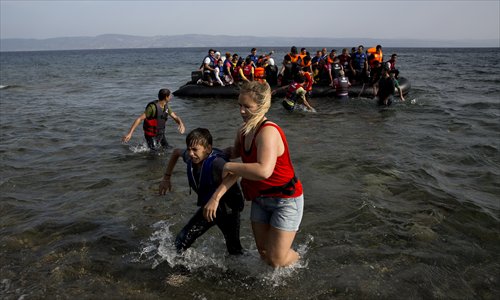HOME >> WORLD
Germany asks more nations to take migrants
Source:Agencies Published: 2015-9-8 0:23:01
Cameron promises to take up to 20,000 directly from refugee camps

A volunteer helps a Syrian boy as he arrives with others at the coast on a dinghy after crossing from Turkey, at the island of Lesbos, Greece, on Monday. The island of some 100,000 residents has been transformed by the sudden new population of some 20,000 refugees and migrants, mostly from Syria, Iraq and Afghanistan. Photo: AP
Struggling to cope with a record influx of asylum seekers, Germany told its European partners on Monday they must take in more refugees too, saying the burden could not fall on just a few countries.
Chancellor Angela Merkel, speaking after a weekend in which some 20,000 migrants made their way to Germany from Hungary by train, bus and on foot, described the events of the past days as "breathtaking" and tried to reassure German citizens that the crisis was manageable.
"I am happy that Germany has become a country that many people outside of Germany now associate with hope," she said at a news conference in Berlin. "This is something to cherish when you look back at our history."
But she and her vice chancellor, Sigmar Gabriel, coupled their message of optimism with a warning to EU partners who have resisted a push from Berlin, Paris and Brussels to agree quotas for refugees from Syria, Iraq and Afghanistan.
Gabriel said that if countries in Eastern Europe and elsewhere continued to resist accepting their fair share of refugees, the bloc's open border regime, known as Schengen, would be at risk.
"This would be a dramatic political blow for Europe, but also a heavy economic blow, also for those countries that are saying they don't want to help now," he said.
Only months after Europe narrowly averted a Greek exit from the euro zone, the refugee crisis has emerged as the bloc's biggest challenge.
European Commission President Jean-Claude Juncker is due to unveil new proposals on Wednesday on how to distribute refugees among member states.
The European Commission will propose national quotas to relocate 160,000 asylum-seekers arriving in Greece, Hungary and Italy, with Germany taking in more than 40,000 and France nearly 31,000. Countries that do not want to take part would be able to make financial contributions to buy their way out of the obligation on a temporary basis.
Meanwhile, President Francois Hollande said on Monday that France is ready to take in 24,000 refugees, dismissing opinion polls showing public opposition to the move.
British Prime Minister David Cameron on Monday also pledged to take in up to 20,000 refugees from camps in Syria over the next five years.
Other countries have resisted taking in refugees, with Poland arguing that it is already burdened by an influx of people from neighboring Ukraine, and Slovakia refusing to take in Muslims.
The number of refugees to be redistributed within the EU is just a fraction of the many hundreds of thousands of refugees and economic migrants that have reached Europe this year on leaky boats across the Mediterranean or over land through the Balkan peninsula.
Germany has announced it is letting Syrians seek asylum regardless of where they enter the EU, suspending normal rules and accelerating a flow of migrants north and west from the edges of the EU.
Just last month, more than 100,000 asylum seekers reached Germany, which is preparing for 800,000 this year, around 1 percent of its population, a move with little precedent for a large Western country.
IS threats
UK newspaper the Daily Express reported on Monday, quoting an operative working for the Islamic State (IS), that the terror group has successfully smuggled thousands of covert jihadists into Europe.
It reported that more than 4,000 covert IS gunmen had been smuggled into Western nations - hidden among innocent refugees.
The operative said the undercover infiltration was the beginning of a larger plot to carry out revenge attacks in the West in retaliation for the US-led coalition airstrikes.
Posted in: Europe